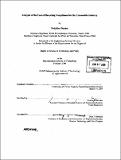Analysis of the cost of recycling compliance for the automobile industry
Author(s)
Dantec, Delphine
DownloadFull printable version (3.893Mb)
Other Contributors
Massachusetts Institute of Technology. Technology and Policy Program.
Advisor
Randolph Kirchain.
Terms of use
Metadata
Show full item recordAbstract
Cars are one of the most recycled commercial products. Currently, approximately 75% of the total vehicle weight is recycled. The EU directives on End-of-life vehicles try to push the recycling process further: it fixed the percentage of recyclability (85%) and recoverability (95%) automotive companies have to reach for their new vehicles in 2015. Complying with these directives will imply a cost, which will be borne by one or several of the stakeholders of the automotive life cycle. This cost will not only depend on the type of the vehicle but also on where the vehicle will be recycled and which recycling processes will be used. The scope of this thesis is to study the recycling cost sensitivity to regional practices and to vehicle's type. A technical cost model has been developed to calculate the cost of applying the regulation. Based on the list of parts of a particular vehicle, this tool allows to determine which parts have to be removed to reach the recycling target and the cost associated with this removal. The model was run for a sample group of vehicles and for different regional inputs. The goal is to pinpoint the major recycling cost drivers and discuss how the total cost can be reduced. Finally, this work analyses the magnitude of exposure of a vehicle manufacturer in Europe.
Description
Thesis (S.M.)--Massachusetts Institute of Technology, Engineering Systems Division, Technology and Policy Program, 2005. Includes bibliographical references (leaves 71-73).
Date issued
2005Department
Massachusetts Institute of Technology. Engineering Systems Division; Technology and Policy ProgramPublisher
Massachusetts Institute of Technology
Keywords
Technology and Policy Program.